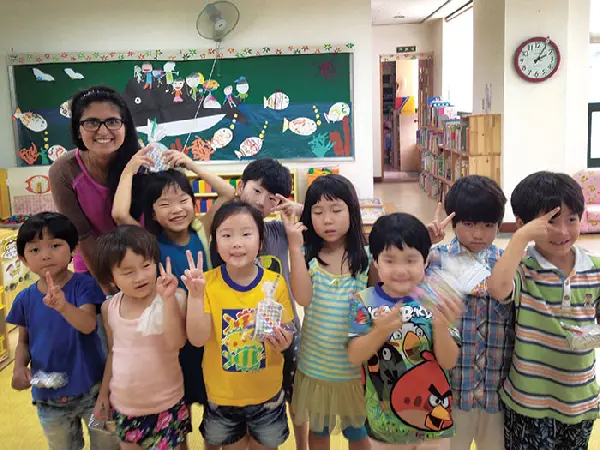 |
| Maliha Rafiq with her students. |
DEARBORN — At this time of year, many female college students in Dearborn contemplate the option of studying or working abroad.
But in most cases, the deciding factor comes down to the parents.
The first question parents ask their daughters is “Why?”, followed by statements like, “A young woman can’t travel by herself.”
The cultural mindset is that parents would allow a young man to travel because he’d have more opportunities to prosper and be a leading example of intellect to other young men in his family and community; but there’s a “concern” that a woman could possibly teach other women how to become independent, develop personally, enhance their resumes and prepare for future careers, eventually altering the social norm.
Some female college students in the community decided to break the stigma and convince their parents to allow them to do just that.
Yakeen Alwishah, a Wayne State graduate with a degree in computer science and a minor in German, took classes in Germany at LMU- Munich in the summer of 2014, but had trouble convincing her parents.
“My dad was kind of iffy at first,” Alwishah said. “He asked why study abroad when we have the best schools in America, but I kept firm on my stance and he eventually came to accept the idea.”
She brought up the fact that she had received a scholarship to study abroad and how it would be a waste of money to stay home. She was working part-time before she left, so she had also saved up enough money to fund the rest of her living expenses.
 |
| Yakeen Alwishah. |
Alwishah admitted she was anxious and afraid the first few weeks because it was her first time living away from home.
“The first few weeks were tough in terms of getting used to living alone and doing things by myself,” she said. “But once I got used to it, I grew as a person and enjoyed the experience.”
The program has been a topic of conversation at job interviews, always helping her stand out.
“The employer who did my initial interview at the company I work at now spoke some German,” she said. “So he definitely remembered me for that.”
Twin sisters Fariha Rafiq and Maliha Rafiq, students at the University of Michigan-Dearborn, traveled to South Korea in 2014, teaching English there for one year through the Teach and Learn in Korea program. Their mother did not think they would get accepted, so she did not worry too much.
“My mom was pretty convinced that we would not get accepted that easily, so she said we could apply and that we could talk about it if we got accepted,” said Fariha, a manufacturing and industrial engineer major.
 |
| Mariam Abdulghani. |
“When we did, we told our parents that this might be our only chance at traveling to a different country, living independently and exploring a different culture.”
The sisters explained that self-financing their trip sealed the deal for their parents.
“Our parents always said that we could travel whenever we could pay for it ourselves,” said Maliha, an accounting and finance major. “And at that point we were both working part-time.”
In the beginning, the sisters— who were placed seven hours away from each other— were scared. However, both adjusted and felt safe.
“We felt really safe,” Fariha said. “There was no problem in traveling alone and we both never experienced any issues living alone. I think it’s something that will look good on our resumes and it can also help us connect with recruiters.”
Maliha said that she’s now open to accepting a job outside the country.
“This work abroad program definitely opened up more career options for us, because we are now willing to work abroad as well as relocate for a job within the U.S,” she said.
Mariam Abdulghani, a University of Michigan graduate with a degree in neuroscience, who has just finished her first year of medical school, did not have to convince her parents to allow her to shadow surgeons in Spain in August 2014.
“I was really nervous, but excited to be traveling alone,” she said. “My parents were very encouraging.”
Abdulghani enjoyed the experience because it allowed her to understand more about health care abroad.
“Traveling just helps you see and appreciate different perspectives,” she said. “It shows you how diverse the world really is.”
Abdulghani did not study abroad just to add credits to her graduate school applications; she wanted to travel while doing something health-related because she is interested in both.
The four agreed that their journeys taught them how to become independent in ways that enriched their college experiences and personal lives, preparing them for future careers and higher education. They believe other young women could benefit from similar experiences and could also enjoy their own successes as a result.






Leave a Reply